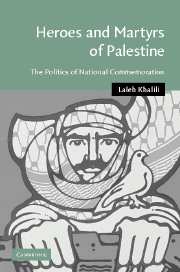Book contents
- Frontmatter
- Contents
- Acknowledgments
- List of abbreviations
- 1 Introduction
- 2 Transnational movements and discourses
- 3 Palestinian lives and local institutions in the camps of Lebanon
- 4 Forms of commemoration
- 5 Contents of commemoration: narratives of heroism, suffering, and sumud
- 6 Guerrillas and martyrs: the evolution of national “heroes”
- 7 Between battles and massacres: commemorating violent events
- 8 Commemoration in the Occupied Palestinian Territories
- 9 Conclusions
- Bibliography
- Index
- Cambridge Middle East Studies 27
9 - Conclusions
Published online by Cambridge University Press: 22 September 2009
- Frontmatter
- Contents
- Acknowledgments
- List of abbreviations
- 1 Introduction
- 2 Transnational movements and discourses
- 3 Palestinian lives and local institutions in the camps of Lebanon
- 4 Forms of commemoration
- 5 Contents of commemoration: narratives of heroism, suffering, and sumud
- 6 Guerrillas and martyrs: the evolution of national “heroes”
- 7 Between battles and massacres: commemorating violent events
- 8 Commemoration in the Occupied Palestinian Territories
- 9 Conclusions
- Bibliography
- Index
- Cambridge Middle East Studies 27
Summary
But where are facts if not embedded in history, and then reconstituted and recovered by human agents stirred by some perceived or desired or hoped-for historical narrative whose future aim is to restore justice to the dispossessed?
Edward Said, “Permission to Narrate”We travel like other people,
but we return to nowhere
We have a country of words;
speak speak so I can put my road on the stone of a stone.
We have a country of words.
Speak speak so we may know the end of this travel.
Mahmud Darwish, “We travel like other people”This book has been about the struggles, failures and triumphs of a nationalist movement in imagining the nation. I have argued that a fundamental practice in the constellation of Palestinian nationalist practices is commemoration, and that narratives contained within commemorative practices are crucial in shaping the stories of Palestinian peoplehood. These commemorative practices – ceremonies, rituals, memorials, and history-telling – all represent, reinterpret, and remember the national past in an ongoing and dynamic way and in so doing, set the stage for crafting future strategies. In trying to better understand nationalism, in earlier pages I have examined Palestinian commemorative forms and the narratives of heroism, suffering and sumud they contain, the emergence of these narratives at the intersection of available transnational discourses and local political institutions, and the diverse and dynamic performances of these narratives for different audiences.
Form and content of commemorations
This study shows that commemorative practices have forms and contents.
- Type
- Chapter
- Information
- Heroes and Martyrs of PalestineThe Politics of National Commemoration, pp. 214 - 227Publisher: Cambridge University PressPrint publication year: 2007



